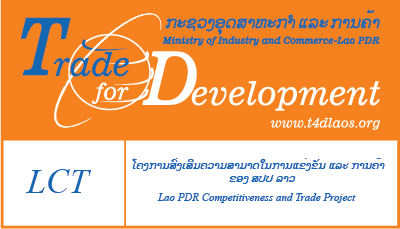Documents

Since 2018, the Lao PDR-World Bank Competitiveness and Trade Project has helped Government to simplify business regulations, facilitate trade, and improve the competitiveness of private firms. This is central to Laos’ economic development as a landlocked country reliant on trade and tourism. The project’s Business Assistance Facility helps private enterprises access advice on management and innovation, especially for women entrepreneurs. In June 2021, the project received additional financing of $6.5 million to help firms weather the COVID-19 pandemic.
Improving the Business Environment
Pillar A: Improving the Business Environment builds on recent support under TDF-2 (P130512) to improve enterprise registration processes, the transparency in administering operating licenses, and overall support to the PM Order No. 2.
Component A.1 (Making it Easier to Start a Business) will focus on two areas: (a) implement reforms to ease the starting of a business, including with respect to related Department of Enterprise Registration Management (DERM) and inter-agency processes; and (b) automate enterprise registration through developing a new online business registration system and establishing computer terminal helpdesks at DERM and selected provincial Division of Industry and Commerce (DIC) offices.
Component A.2 (Streamlining and Publishing Operating Licenses) will provide implementation support to (a) streamline business operating license administration and (b) set up an online portal of business licenses as a public repository of up-to-date and relevant information concerning such licenses.
Component A.3 (Support to Broader Business Reforms) will support the Government in the implementation of PM Order No. 2 and in the coordination and monitoring of the complex reform program.
Facilitating Trade and Connecting to Markets
Pillar B: Facilitating Trade and Connecting to Markets is designed to support the Government of Lao PDR in implementing the provisions of the WTO TFA.
Component B.1 (Supporting the Trade Facilitation Secretariat) will support the Trade Facilitation Secretariat (TFS) to strengthen its capacity (as well as that of other relevant line ministries and agencies) to implement the recipient’s trade facilitation agenda, including carrying out stakeholder consultations; identifying, prioritizing, and coordinating trade facilitation initiatives; and monitoring and advancing the implementation of related reforms.
Component B.2 (Trade Facilitation Agreement Challenge Facility) will establish a “TFA Challenge Facility” (TFACF) to carry out additional proposed activities related to the implementation of the TFA.
Improving Firm-Level Competitiveness
To complement improvements in the overall business and trade environment, this pillar will support individual private enterprises in accessing business development services through a matching grant facility.
Supporting Better and More Inclusive Policies
This pillar will support effective project implementation, monitoring, and evaluation, and improved economic analysis policy making under the MOIC’s leadership.
Component D.1 (Project Management and Coordination) will support the Department of Planning and Cooperation (DPC), and especially the National Implementation Unit (NIU), in overall project coordination across the Government, supporting and overseeing implementing departments in project implementation, undertaking procurement and fiduciary tasks, monitoring implementation progress, managing the Trade and Private Sector Working Group (TPSWG) as its Secretariat, and achieving outcomes.
Component D.2 (Improving Policy Making and Transparency) will focus on enabling (a) the MOIC and other relevant ministries and departments to undertake improved economic analysis in support of evidence-based policy making and (b) public access to trade-related information for the purpose of promoting a transparent and predictable policy environment.
Component D.3 (Supporting Public-Private Dialogue) will continue to support and strengthen the existing public-private dialogue under the Lao Business Forum (LBF) to effectively address challenges faced by the private sector in Lao PDR